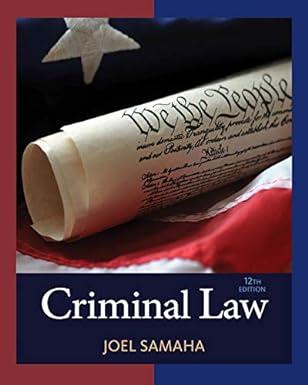Jeffrey Belew was convicted and sentenced to 27 years in prison. The Ohio Court of Appeals affirmed
Question:
Jeffrey Belew was convicted and sentenced to 27 years in prison. The Ohio Court of Appeals affirmed his conviction. A majority of the Ohio Supreme Court let the conviction and sentence stand without opinion. But, one justice dissented, and wrote the following opinion. I respectfully dissent from the court’s decision to dismiss this case as having been improvidently accepted. Amici curiae in support of appellant, Jeffery Belew, filed two memoranda in support of jurisdiction asserting that this case involves a matter of great general interest and public importance and filed two supporting merit briefs.1 And although the state does not disagree with Belew’s proposition that “when credibly diagnosed, a trial court must consider combat-related post-traumatic stress disorder and other service-related disabilities as mitigation when imposing sentence on a military veteran,” it argues that the trial court here did properly consider those factors when sentencing him.
I believe that we should render an opinion on how post-traumatic stress disorder (“PTSD”) must be considered by a court when it sentences a military veteran. And just as important, we should clarify the standard that an appellate court must use in reviewing a sentence of this type. It is my position that only a full opinion by this court will clarify both the appellate court’s standard of review and the trial court’s need to support the record for a felony sentence.
Facts
On April 10, 2011 Belew fired at least four shots at police officers who were responding to a domestic-disturbance call in Oregon, Ohio. Belew’s shots struck an arriving police car twice, and he did not respond to commands to cease fire until he was wounded by shots fired by the officers. He was arrested and received hospital care.....
1. List the facts relevant to deciding whether Jeffrey Belew suffered from PTSD.
2. Summarize the trial judge’s reasons for rejecting Belew’s claim that his PTSD excused his otherwise criminal conduct.
3. Summarize Justice Lanzinger’s reasons why he believes that PTSD deserves more attention.
4. Why does dissenting Justice O’Neill “suggest that one trial court judge, three appellate court judges, and the majority of this court simply do not get it. PTSD is not an excuse. It is an explanation.”? Do you agree? Defend your answer.
Step by Step Answer:






